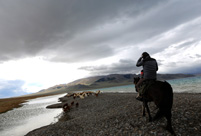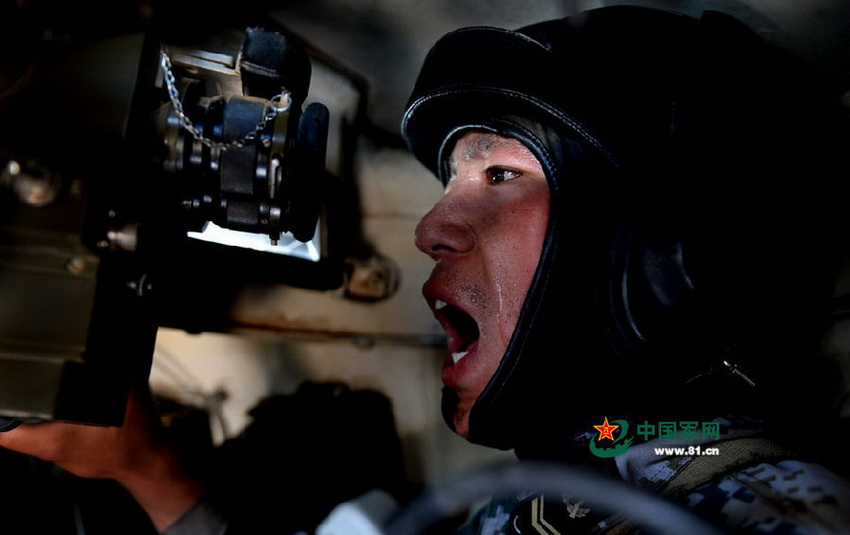 US aircraft carrier docks in HK, welcomes PLA aboard
US aircraft carrier docks in HK, welcomes PLA aboard
 Graduation season: 'Take graduation photos to mark our love'
Graduation season: 'Take graduation photos to mark our love'
 College-student-turned nun becomes famous on Internet
College-student-turned nun becomes famous on Internet
 Japanese airplanes tail Chinese warplane in China's ADIZ
Japanese airplanes tail Chinese warplane in China's ADIZ
 China applies for UNESCO listing of Nanjing documents
China applies for UNESCO listing of Nanjing documents
 Picturesque scenery in Hongcun Village
Picturesque scenery in Hongcun Village
 Japan's PM vows to resume commercial whale hunt
Japan's PM vows to resume commercial whale hunt
 Luoyang aims to become 'Chinese Culture City'
Luoyang aims to become 'Chinese Culture City'
 Century-old jade disc found confirms ancient legend
Century-old jade disc found confirms ancient legend
 A serious mind behind Chinese leader
A serious mind behind Chinese leader
Guo Wanda, executive vice president of the China Development Institute(CDI) in Shenzhen, southern China's Guangdong province.
The White paper points out that the central government and the government of Hong Kong Special Administrative Region (HKSAR) are committed to the gradual development of a democratic political system in accordance with the Basic Law of the HKSAR and the regulations made by the NPC Standing Committee.
Why should we place emphasis on the role of Basic Law in the progressive development of Hong Kong's democratic political system?
Firstly, Hong Kong lacks the democratic tradition and spirit. Hong Kong had no democracy under British rule. The so called “Administrative Absorption of Politics” refers to a mode of recruiting powerful and influential Hong Kong citizens into the official and quasi-official organizations for the purpose of maintaining the British rule in Hong Kong and reducing the threat posed to the rule by the Hong Kong Chinese. As the British and Hong Kong authorities had no intention of offering democracy to the general population of Hong Kong, it is generally held that Hong Kong enjoyed freedom rather than democracy and that Hong Kong residents did not have a strong sense of democracy at the time, which is one of the features of the Hong Kong society. Naturally, it is best that a society without the democratic tradition should gradually develop democracy to ensure prosperity and stability and Hong Kong's smooth return to China.
Secondly, the promotion of democracy depends on the need to improve standards of living and develop the economy. Hong Kong is a model of development in Asia, featuring free competition and relative fairness under the rule of a clean government during the draft of the Basic Law. The implementation of radical democracy might lead to great instability in Hong Kong if it sweeps through like a violent storm.
Thirdly, the gradual development of democracy has met with opposition both at home and abroad. In the last five years of British rule in Hong Kong, Chris Patten, Britain's last Hong Kong governor, implemented political reform to give Hong Kong residents the democracy they had never enjoyed during more than one hundred years of British rule. It was demonstrated later that the reform was not so much a measure of returning power to the people of Hong Kong as one of looking to create agents after the "ignominious retreat" of the British. Currently, key opposition figures in Hong Kong maintain close contact with Britain and the U.S. They lobby for radical democracy and claim that it would develop the economy and improve standards of living, but their real intention is to disrupt Hong Kong's administration. In this sense, the gradual development of democracy encounters opposition both at home and abroad.
The article is edited and translated from 《本報(bào)特約專(zhuān)家解讀香港白皮書(shū)》, source: People's Daily Overseas Edition, author: Lian Jintian, a reporter of People's Daily
 Graduation photo ideas: reliable alumnus and happy alumna
Graduation photo ideas: reliable alumnus and happy alumna Super daddies in 2014 World Cup
Super daddies in 2014 World Cup College girls take stylish photos to help enrollment
College girls take stylish photos to help enrollment Rebuilding the silk road
Rebuilding the silk road Top 10 Chinese products scoring World Cup goal
Top 10 Chinese products scoring World Cup goal PLA units hone their tank combat skills
PLA units hone their tank combat skills Attendants shine at Xinjiang-Lanzhou high-speed rail
Attendants shine at Xinjiang-Lanzhou high-speed rail Jiuzhai Valley - fairyland of the world
Jiuzhai Valley - fairyland of the world Can't take eyes off national teams in World Cup
Can't take eyes off national teams in World Cup In Pictures: Female fans of World Cup
In Pictures: Female fans of World Cup China's top 10 representative architectures
China's top 10 representative architectures Photo story: A day of 'mini girl'
Photo story: A day of 'mini girl' Top 20 hottest women in the world in 2014
Top 20 hottest women in the world in 2014  Cute animals' leisure summer in zoo
Cute animals' leisure summer in zoo Exhibition of the Buddha held in Tibet
Exhibition of the Buddha held in TibetDay|Week|Month